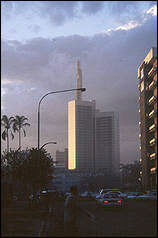
|

|

Managers:
- Hon. Ndolo Ayah, Chairman
- Mr. A.K. Cheserem, Managing Director
Contact
Mrs. Alice Koech,International & Public Relations Manager
Postal Address: P.O. Box 30301, Nairobi, Kenya.
Visiting Address: General Post Office, 7th floor Kenyatta Avenue, Nairobi
Tel: 254 (2) 227401 or 254 (2) 247833
Fax: 254 (2) 251071 or 254 (2) 330435
E-mail: akoech@eafix.net
|
 Company Profile Company Profile |
 The Business The Business |
Telkom Kenya Limited is a company incorporated in Kenya, licensed to provide and operate telecommunication facilities and services by the Communication Commission of Kenya (CCK) under the provisions of the Kenya communications Act, 1998. The company was established under the Companies Act (Cap 486) on April 1ST 1999, it started operations July 1st 1999 and is wholly owned by the government. With just over 400,000 telephone lines in serve and 290,000 subscribers, representing less than l telephone per 100 people, Kenya's level of telephone penetration is among the lowest in countries of comparable economic status. This is despite a large demand for telecommunication services, as evidenced by registered waiting list over 100, 000 people. The actual number of people waiting for service is estimated to be much higher that the registered list.
 Aim Aim |
The aim of Telkom Kenya is to be a world class telecommunications operator providing efficient, affordable, sustainable and cost effective modern services of the highest level of quality and reliability. The company envisages being a market leader in the provision of communication solutions.
Telkom's core business will continue being provision and operation of telecommunications business but with a more commercial approach as opposed to the past. Accordingly telecommunication services will be offered at very competitive rates to both the operators and subscribers thus taking advantage of the limited exclusivity period of operation in the selected service and facility provision areas granted by the Communication Commission of Kenya which is the controlling authority.
 Network development Network development |
As a newly established telecommunication private entity Telkom will immediately address the expansion and modernization of the network at an estimated cost of USD 2 billion for the next three (3) years as most of the equipment has outlived their economic life span. This is expected to relieve congestion, increase network security and resiliency, and allow for greater functionality and co-ordination of network efficiency. To achieve the ideal network Telkom shall utilize the most up to date state of the art technologies that are not only modern and cheap but that also provide added functionality to the network.
 Institutional Set-up Institutional Set-up |
The company, though wholly owned by the Government, is expected to sell 26% of its shares to a strategic equity partner with future floatation at the Nairobi Stock Exchange. It is anticipated that Telkom will have an authorized share capital of USD 0.53 billion (equivalent Kshs. 40 billion) comprising 3.2 billion shares of which, 2.4 billion will be ordinary shares of Kshs. 10 each and 800 million 9% preference shares of Kshs. 20 each. It is envisaged that these shares will be fully paid up for prior to the required network investment.
 Viability Viability |
Telkom, the former Kenya Posts & Telecommunication Corporation, has for a long time provided and operated telecommunication services in Kenya. Telkom predecessor has been profitable with most of the revenue being derived from the basic telecommunication services. Having inherited this strong feature, the company is expected to perform even better with an average return on funds invested of 32% per annum.
 Conclusion Conclusion |
In the next three years therefore, Telkom aims to improve telecommunication services and facilities as well as set the pace for competition. Through facilitation of efficient and quality services and telecommunication facilities, the company hopes to enhance economic development. The high profits retained from the company's operations will be reinvested to further improve the telecommunications sector. Telkom is also expected to generate adequate returns to all capital providers including debt providers, equity and quasi-equity holders.
 OBJECTIVES OBJECTIVES |

Telkom's overall objective is to build a substantial business in the country as quickly as possible in order to maximize benefits to customers who have been waiting a long time for service, and to strengthen its presence, thus preparing Telkom for future competition.
Telkom therefore will:
Focus on customer requirements and provide high quality services.
Provide efficient, affordable, sustainable and cost effective modern services.
Upgrade and modernize the telecommunication network using state of the art technologies.
Provide interconnection facilities to other license operators
Contribute to the economic growth of the national economy through enhancement of service penetration and accessibility in accordance with Telkom universal services obligation.
 Licenses Licenses |
Telkom is licensed by the Communication Commission
of Kenya (CCK) to run telecommunication systems
of all descriptions in Kenya and telecommunication
systems serving points within and outside Kenya.
It will also provide local, long distance and international
services. The licenses run for twenty five years
with an exclusivity period of 5 years starting from
1st July l999. A separate license was
issued to Safaricom, Telkom's wholly owned subsidiary
to run the GS M system for fifteen years. The company
has also been licensed to operate and provide VSAT
and internet backbone facilities and services for
five years with an exclusivity period of five years. |
Telkom will face competition immediately in the provision of Global Mobile Personal Communications via Satellite (GMPCS), customer premises wiring, terminal equipment and maintenance, repair workshop services and facilities, and value added services. The licenses for operation of these services were also issued for a period of five years. In addition to these, two licenses to operate Radio stations for one year have been issued to Telkom and Safaricom.
 Corporate structure Corporate structure |
Telkom has four subsidiaries engaged in the provision and production of telecommunication services and products:-
Gilgil Telecommunication industries (GTI), producing a range of electronic and construction equipment used in telecommunication network.
Safaricom, offering mobile cellular services. Telkom will soon be entering into a joint venture partnership with Vodafon of UD to operate the company at a 70/30 equity ratio.
Kenya Communication College of Technology (KCCT), a training institution offering telecommunications and postal courses. At a later stage a 305 stake will be sold to a joint venture partner.
Postal Directories, in which Telkom has a 405 shareholding, while 60% is held by the joint venture partner.
 STATUS OF TELECOMMUNICATIONS IN KENYA STATUS OF TELECOMMUNICATIONS IN KENYA |
Currently, Telkom installed line capacity for basic telephone service stands at 405,390 with 288,251 lines connected, of which 7,848 are public pay-phones as at June 1999. The vast majority of installed lines are in the urban areas with over 60% of the total connections in the Nairobi region. Approximately 965 of the local exchanges are automatic and 58% are digital.
The transmission network is 86.2% digital, comprising optical open wire, PCM cable, coaxial cable, digital and analogue radios and digital radios. Currently the network hierachnical structure is composed of four layers, namely; the International Switching Center (ISC), National Switching Center (NSC), Area Switching Centers (ASC) and Group Switching Centers (GSC).
 PRODUCTS AND SERVICES PRODUCTS AND SERVICES |
Telkom provides basic telephone services using the traditional copper pair to 288,251 customers with facilities for local, long distance, international and operator assisted calls. The company also offers fixed telephone services (voice, fax and data services) using the Wireless Local Loop (WLL) technology, branded as "instafon" with an equipped capacity of 2,000 lines, expandable to 50,000 lines. Presently the connections stand at 1,500 lines.
 Payphone services Payphone services |
An important strategy of Telkom is to provide pay-phones in both the urban and rural areas. The company provides three types of public payphones, namely, the Cardphone, combiphone (using both card and coins) and coin-phones. They have both subscriber trunk dialing and operator assisted facilities. The services are offered all over the country with 7,754 connections.
 Telex / Telegraph services Telex / Telegraph services |
Telex and telegraph services are still widely used in Kenya. Due to technological changes in telecommunications, demand for the service has been on the decline. The telex facility has a capacity of 3,616 lines with 1,516 subscriber connection.
 Value added services Value added services |
The standard analog leased lines service for data transmission branded as KENLINE.
Currently there are 1,700 subscribers and the demand has been on the decline due to the introduction of more cost effective and technologically superior services.
Digital leased lines, branded KENSTREAM, with a capacity of 2,000 lines and 180 accounts available in Mombasa and Nairobi.
Internet backbone, branded JAMBONET, currently providing facilities to 16 internet service providers, with Points of Presence (POP) in Mombasa, Nairobi, Nyeri, Nakuru, Kisumu and Eldoret.
The Very Small Aperture Terminals (VSAT) network, branded KENSAT offering both telephone and data services, with a capacity of 1,200 circuits. The VSAT hub is at the commissioning stage, and is targeting businesses with branches all over the country, in East Africa and the COMESA region.
Inmarsat terminals, branded SAFARISAT, sold by Telkom on commission.
Provision of subscriber terminal equipment, mostly from the Company's subsidiary, GTI, through telecentres strategically positioned.
Provision of interconnect and ling facilities to other service providers.
 MARKET OVERVIEW MARKET OVERVIEW |
The telecommunication sector in Kenya has grown steadily over the years though at a low pace. As at June 1999 the network had a capacity of 405,390 lines having grown from 375,000 lines in 1996. The tele-density has registered minimal growth from 0.92 in 1996 to 0.98 in 1999. On the other hand service utilization has continued to grow registering average annual growth rates of between 10% to 11%. Of the total line connections, 70% are in Nairobi region as well as the waiters.
The telecommunication industry in Kenya is worth approximately Kshs. 200 billion per annum, of which Telkom represents 20% of the entire market. The industry is expected to grow by 20% over the next five years, which will be attributed to liberalization of the industry, a more educated clientele, extensive use of internet services and the opening up of trade between the African countries, most of whose economies are undergoing restructuring. |
|
© World INvestment NEws, 1999.
This is the electronic edition of the special country report on Kenya published in Forbes Global Magazine.
November 29th 1999 Issue.
Developed by AgenciaE.Tv |
|
|
|
| |
|
|
|
|

